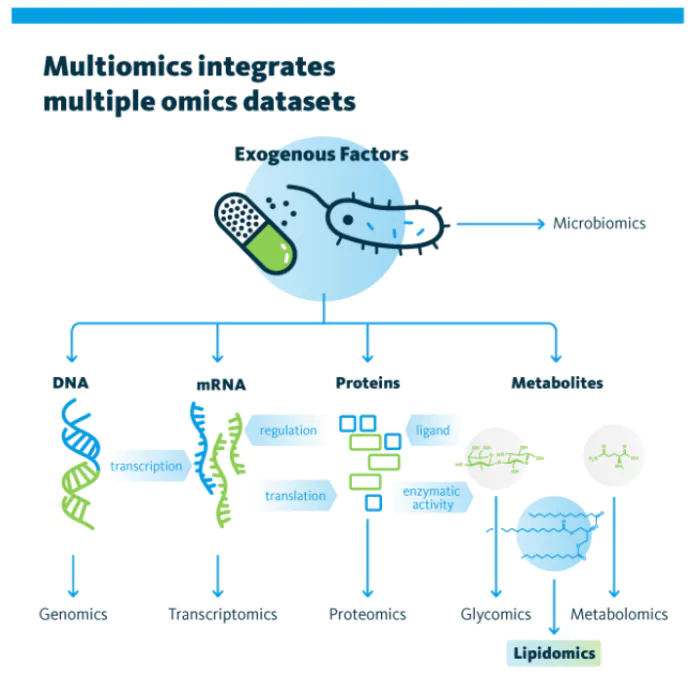Multi-Omics is an emerging technology in the field of clinical science in India.
About Multi-Omics
- Multi-omics (multiple omics) is a new approach in biological sciences where the data sets of different omic groups are combined to power discovery across multiple levels of biology.
- By combining data researchers can achieve a more comprehensive understanding of molecular changes contributing to normal development, cellular response, and disease.
 Omic Groups:
Omic Groups:
- Genomics: It focuses on the structure, function, evolution, mapping, and editing of information coded within an organism’s DNA.
- Transcriptomics: Study the complete set of RNA transcripts produced by the genome.
- Proteomics: Evaluate protein expression for a better understanding of cellular function and prediction of therapeutic responses.
- Epigenomics: Examine heritable changes in gene expression activity caused by factors other than DNA changes.
- Metabolomics: Metabolome comprises all the metabolites present in a cell, tissue, or organism, including small molecules, carbohydrates, peptides, lipids, nucleosides, and catabolic products.
- Microbiomics: It consists of all the microorganisms of a community. Microbes have been found in human skin, mucosal surfaces, and gut.
- The microbiome is analyzed by sequencing the 16S rRNA genes or metagenomics quantification.
- Omics datasets: They are libraries characterizing a specific biological feature, such as the genes, lipids, proteins, metabolites, or microbes of an organelle, cell, tissue, or organism.
- Individual analysis of an omics dataset can identify links between the characterized feature and a specific biological phenomena.
- Multi Omics Stratergy: Multiomics is the integrated analysis of multiple omics datasets through which one can identify mechanisms of action, biomarkers, networks, pathways, and other relationships present in physiological and pathological processes.
- The field encompasses all the omics fields and aims to understand the native and altered state of an organism by the analysis of the data from different omics experiments.
- Purpose: Multi Omics approach is critical to find strategies to characterize, monitor, predict and find treatment to many diseases
Enroll now for UPSC Online Course
India’s approach to Multi Omics
- India is creating disease-specific datasets with many disease specific consortia emerging around the country creating datasets to address individual health problems, ranging from tuberculosis to cancers, rare genetic disorders in children, and even antimicrobial resistance.
- The Indian Gene Map:
-
- The Genome India project: The project is a national initiative which aims to develop a reference genome for Indian people, which will help design genome-wide and disease-specific ‘genetic chips’ for low-cost diagnostics and research.
- The Department of Biotechnology had completed sequencing 10,000 genomes from 99 ethnic groups.
- Mission IndiGen: The Council for Scientific and Industrial Research (CSIR) had sequenced the entire genomes of 1,008 individuals in India representing diverse ethnic groups.
- The Mission aims to create a pilot dataset with which researchers could analyse the epidemiology of genetic diseases and help develop affordable screening approaches, optimise treatment, and minimise adverse events for them.
- Role of AI: More value is being attracted by combining these individual datasets using artificial intelligence and machine learning with other extensive datasets on proteins (proteomics), gene expression in cells (transcriptomics), and epigenomics to develop a ‘multi-omics’ approach to tackle diseases.
- Usage: AI and ML based approaches are used in in-house bioinformatic pipelines as well as part of commercial tools for analysis of the sequencing data to identify disease-causing variants
- Ease of Analyses: AI and Machine Learning can help predict an individual’s risk of developing cancer, develop diagnostic tools to detect some cancers early, classify them, and develop treatment strategies
India’s Disease Specific Initiatives
- Tuberculosis: The Indian Tuberculosis Genomic Surveillance Consortium (InTGS) comprises 10 sites covering eight states aims to sequence around 32,000 tuberculosis clinical strains from active patients, and develop a centralised biological repository of clinical Mycobacterium tuberculosis strains in India.
- Goal: It is to validate identified mutations to develop a sequence based method to determine drug resistance, and to combine the epidemiological data with results from whole-genome sequencing to develop working solutions.
- Rare genetic disorders: India has also launched a pan-country Mission for Paediatric Rare Genetic Disorders (PRaGeD) which plans to create awareness, perform genetic diagnosis, discover and characterise new genes or variants, provide counselling, and develop new therapies for rare genetic diseases.
- Data Source: The mission will incorporate IndiGen data in its in-house bioinformatic pipelines and will use to analyse the parts of a genome that code for proteins (exome).
- Cancers: The Indian Cancer Genome Consortium (ICGC-India) is a part of the larger International Cancer Genome Consortium (ICGC) and is supported by the Department of Biotechnology, plans to characterise genomic abnormalities in different types of cancers in Indian patients and identify population-specific genetic variations that are linked to cancer risk and treatment response.
- The Indian Cancer Genome Atlas project: It is a not-for-profit public-private-philanthropic initiative that will create a comprehensive catalogue of genomic alterations across various cancer types prevalent in India
- The projects can facilitate the discovery of novel biomarkers, potential new treatment targets, and personalised treatment strategies
- Antimicrobial resistance: Genome sequencing provide information about the resistance profile of microbes therefore helping clinicians make judicious use of antibiotics.
|
Check Out UPSC CSE Books From PW Store
Emerging technologies:
- Emerging technologies refer to new, futuristic and innovative technologies that are being developed or introduced but their potential is not fully established and realised.
- Attributes: Radical novelty, fast growth, coherence, prominent impact, and uncertainty and ambiguity.
- Examples:
-
- Artificial Intelligence; Blockchain; Augmented Reality and Virtual Reality; Machine Learning; Internet of Things; Gene Editing etc
|
![]() 27 Jun 2024
27 Jun 2024
 Omic Groups:
Omic Groups: